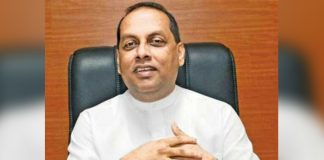Sri Lanka minister hunts forex for June oil imports
ECONOMYNEXT – Sri Lanka’s Energy Minister Kanchana Wijesekera said he met Central Bank Governor Nandalal Weerasinghe on discuss foreign exchange needs to import oil for June as the country faces forex shortages due to money printing.
State-run Ceylon Petrolem Corporation needs 554 million US dollars to import oil in June and and 100 million US dollars is provided through the Indian Credit line, he said.
A 500 million US dollar facility is also being discussed, he said.
As of 12 noon on May 30, Sri Lanka had 14,433 metric tonnes of diesel, 58 tonnes of super diesel, 41,975 metric tonnes of petrol, 14,041 metric tonnes of 95 octane petrol and 1,621 metric tonnes of Jet fuel.
Another diesel shipment is due to arrive at 1800h on May 30, he said.
Sri Lanka’s sole refinery which processes about 35,000 barrels a day has re-started operations also on May 30.
Sri Lanka this week bought a consignment of Siberian light crude for the refinery for which payments will be done in August.
Sri Lanka is facing the worst currency crisis in the history of the island’s 72-year intermediate regime central bank.
When the central bank prints money to control a policy rate through open market operations or directly finance the deficit, or to reject bids for Treasury bill auctions, the currency comes under pressure and the credibility of the peg breaks and there are forex shortages. (Colombo/May30/2022)
If you can grow, now is the time : Agri Minister
How a fertilizer ban became a part of Sri Lanka’s Crisis
Sri Lanka drug suppliers say hit by arrears, regulatory morass, forex...
ECONOMYNEXT – Sri Lanka’s pharmaceuticals suppliers are hit by payment delays and are also facing regulatory delays, and price controls which are making a shortage of drugs in the country worse an industry official said.
Local suppliers are owned around 7 billion rupees from a state pharmaceutical agency, an industry source said.
It had made it difficult for companies to continue supplies.
“If you to get a heart attack today it’s likely that you will not receive clot dissolving therapies,” an industry official who declined to be identified said.
“Or if you were to be bitten by a rabid dog you are unlikely to receive rabies virus neutralizing anti body injections both situations that can lead to a death sentence.”
Sri Lanka is facing severe foreign exchange shortages after the country’s soft-pegged central bank printed money and the currency collapsed from 200 to 380 to the US dollar, amid a botched float attempted with a surrender requirement.
The falling rupee and inflation fired by the central bank have pushed up inflation to around 40 percent.
Forex shortages still persist amid interventions.
The National Medical Regulatory Authority set up by the ousted Yahapalana regime has also imposed price controls, making it difficult to supply goods as costs went up, though prices have recently been raised.
Analysts had warned several years got that the Yahapalana regime should have curtailed the freedom of economists to print money by reducing its discretionary powers than bringing a price control agency.
The rupee collapsed from 131 in 2015 under money printed to target an output gap.
“Despite recent price increases granted, they even fail to mitigate the exchange loss, while cost of fuel, vehicles, parts, electricity and wages all have seen a dramatic escalation,” the official said.
“None of these have been compensated while they are major factors of distribution, cold storage, and inventory.”
NMRA gave the permission to increase the price of medicines twice in 2022 and the increase done in March, NMRA gave the permission to raise drug prices by 29 percent.
Many companies which import goods on suppliers’ credit are facing losses and are unable to supply medicines at contracted rupee rates, officials have said.
Pharma importers complain that the NMRA has added layers of regulation and costs.
It charges money to issue shipment clearance certificates and delays.
“As these clearance certificates are issued to each and every shipment, thousands of these certificates need to be issued consuming the capacity of the NMRA but generating more and more revenue to it,” an importer said.
Renewals of import licenses are also being delayed, he claimed.
Meanwhile the NMRA defended itself saying it had approved 30 medicines and 36 medical equipments to be imported without any registration through expert committees during the past two months.
NMRA also said, emergency clearance was given for 300 medicines and 48 medical equipment in the last two months.
“Unlike other goods, quality of medicines cannot be determined by the external looks, and irregular methods of clearing can cause injuries to a person’s life,” NMRA said in a statement.
“Taking the crisis for an advantage some medicine mafias are trying to import less quality medicines to the country,”
It also said, through a separate unit established, NMRA gave the authority and registered 150 medicines in the last two months after quality checks as an emergency project and around 20 manufacturing companies including four newly established companies were also cleared and authorized to manufacture medicines.
“It is clear that the lack of forex has resulted in medicine and other essential goods shortage in the country and the authority bodies are not responsible for that.,” NMRA said.
“The forex issue has directly impacted the importation of medicines as well as raw materials to manufacture medicines. Also the crisis in fuel, power and transportation has also disrupted the medicine industry and all of that is beyond the control of NMRA,”
NMRA said, by blaming the authority bodies the problem will be not resolved and only complicate it further.
The costs of maintaining the regulator have to be paid by sick people.
Banks are refusing to open Letters of Credit amid the forex shortage created by the central bank, and some small importers have been forced to halt operations, the industry says.
Forex shortages can only be created by a central bank, since it is the only agency that can print money and create excess demand.
“Importers who were earlier enjoying 90-120 days of credit from the manufacturers or the suppliers from India are now expected to pay 115 percent of the value of the proforma invoice in advance to import,” the source said.
“All of these factors have led to the current out of stock situation. It is not just the lack of dollars the banks,” the source said.
(Colombo/May28/2022)
Sri Lanka gifted medicines by France after soft-peg collapse
ECONOMYNEXT – France has gifted Sri Lanka anesthetics and respiratory medications worth 300,000 Euros, Health Minister Keheliya Rambukwella said as the country fights a medicine shortage coming from a foreign exchange crisis driven by money printing.
“I’m truly grateful for this timely gift and assure the Sri lankan people that no stone will be left unturned in ensuring availability of meds & industry efficiency,” Minister of Health, Keheliya Rambukwella said in a twitter.com message.
Had the pleasure of receiving H.E. @LavertuEric, Amb of France who gifted €300k worth of anaesthetic & respiratory meds. I’m truly grateful for this timely gift & assure the #lka people that no stone will be left unturned in ensuring availability of meds & industry efficiency. pic.twitter.com/aYLBa4N4Na
— Keheliya Rambukwella (@Keheliya_R) May 26, 2022
Sri Lanka is suffering the worst currency crisis in the history of its 72 year old intermediate regime central bank which triggers currency collapses after printing money to keep interest rates down.
In 2022 the rupee fell from 200 to 380 to the US dollar as an attempt was made to float the rupee with a surrender requirement and without significantly raising rates to limit domestic credit.
Rates were later hiked, but forex shortages still persists amid a surrender rule, interventions and money printed to pay state workers.
Sri Lanka has struggled with the unstable soft-peg where currency crisis have intensified under more activist open market operations and output gap targeting (monetary stimulus) from 2015. In 2019 December taxes were also cut to target an output gap. (Colombo/May28/2022)
Sri Lanka shares post third weekly gain despite four-session fall
ECONOMYNEXT – Sri Lanka’s stock market posted a gain for the third straight week despite it saw four straight session losses through Friday (27), amid investors awaiting to see some political and economic stability amid crisis-hit island fears of tax hikes and job losses.
The week ended on May 27 saw new cabinet appointments, fuel price hike to a a record high level, and Sri Lankan officials concluding technical level negotiations with the International Monetary Fund while Prime Minister Ranil Wickremesinghe, who has been advocating sound economic policies was appointed as the finance minister.
Market analysts said investors expect a new budget with some tax hikes and new revenue measures under Wickremesinghe while the IMF deal to go through once the debt restructuring is done.
“Overall the market is moving on the IMF and budget news. Nothing is going to be positive in the budget. So we will see this until the budget and will be highly volatile,” a top market analyst said.
IMF at the end of the technical level discussions said that it needs sufficient assurance that the country will restore debt sustainability during the course of the debt-restructing process.
“The IMF comment did not assure anything so it dampened the sentiments,” the analyst said.
The All Share Price Index (ASPI) closed 0.05 percent or 4.03 points down at 8,315.55 on Friday, but it gained 0.6 percent on the week.
Analysts say investors had been moving to the sidelines throughout the week as more news on heavily taxed budgets circulated while some investors shifted their funds to fixed assets like government securities which are giving around 24 percent annual return.
This week also saw the country hiking it’s fuel prices to record levels yet again. Added to the worries, the central bank governor’s comment on the country’s growth contracting to record levels due to the economic crisis also dented the sentiment.
The most liquid index S&P SL20 fell 0.42 percent or 11.50 points to 2,733.04 on Friday.
The week saw an average daily turnover of 2 billion rupees, nearly a half of this year’s average daily turnover of 4.0 billion rupees.
Sri Lanka’s sovereign default has already led it to restricted/selective default rating by rating agencies and has been weighing on the investor sentiment. The 84.5 billion economy has already suspended foreign debt payments as it had run out of dollars.
Investors are also concerned over the steep fall in the rupee, which has fallen over 80 percent since it was allowed flexibility on March 7.
The market has gained 9 percent in May so far following a loss of 23 percent in April and 14.5 percent in March.
The market has lost 31.9 percent so far this year after being one of the world’s best stock markets with an 80 percent return last year.
Foreign investors sold a net 104.2 million rupees worth of shares this week. The market has witnessed a total foreign outflow of 1.3 billion rupees so far this year.
On Friday, the ASPI was dragged down mainly by John Keells Holdings, which fell 2.7 percent to 125.50 rupees a share.
In addition to that, Sampath Bank fell 1.8 percent to 37.70 rupees a share while Hayleys slipped 2.8 percent to 69.00 rupees a share (Colombo/May28/2022)
Sri Lanka targeted by high priced renewables amid economic crisis
ECONOMYNEXT – Sri Lanka will give immediate provisional approval for renewable projects but their prices have been to be revised to ‘reasonable’ levels, Power and Energy Minister Kanchana Wijesekera has said.
Sri Lanka’s state-run Ceylon Electricity Board is one of the last state agencies to develop an evidence based planning but powerful lobbies (generally called mafia’s) undermine the plan with ad hoc expensive plants inserted outside competitive tendering.
Sri Lanka recently called for Expressions of Interests investors and there are proposals to locations where the cash strapped island’s grid does not have capacity to absorb the renewables, industry analysts say.
The CEB in its long term generation plans has identified locations to which renewable plants can be connected at no cost and while others are planned out to connect to locations were the grid is enhanced under in projects funded by multilateral lenders such as Asian Development Bank.
However ad hoc plants will require load the CEB to pay annuities for grid and also commit to pay high prices for up to 20 years to foreign investors, industry analysts said.
Analysts have likened the high priced long term renewable deals outside competitive tender in the midst of high global oil prices, to the way state-run SriLanka Airlines at one time bought Airbuses at high prices committing the airline to long term leases.
Minister Wijesekera however said prices will have to be revised to reasonable levels.
“Provisional approvals to be granted immediately for proposed projects,” Minister Wijesekera said.
“Revise rates to reasonable. After PA is issued, work with CEB, SEA and Investor for transmission line and grid capacity enhancement with the required investment coming from the project investor.”
Sri Lanka has a grid which is built for central distribution and has to be upgraded in stages. Renewables power is intermittent, cannot be dispatched and requires storage at addition cost – such as batteries – to be deployed at peak times.
Related
Sri Lanka generation plan renewable power share for 2030 equal to Germany: CEB engineers
To upgrade the grid to 400kV to reach a 70 percent target by 2030 from the 53 percent in the long term needs 1.7 billion US dollars at least and another 2.0 billion US dollars for batteries.
Minister Wijesekera said rooftop solar would also be encouraged in state agencies industries and hotels.
Current tariffs are expected to triple when prices are raised, he said.
The steep rupee depreciation as well as global inflation fired by the Fed has also pushed up renewable costs.
CEB has been encouraging renewables in recent long term generation plans as technology matured and Chinese industries in particular started to export ever cheaper solar panels and the efficiency of the panels also went up.
However the agency had come under fire from lobbies who wanted to connect projects without competitive tendering. (Colombo/May27/2022)
Identify cultivable lands in urban areas: PM
Sri Lanka listed firms to stop printing annual reports after forex...
ECONOMYNEXT – Sri Lanka’s listed companies can forego printing annual reports for the financial years ended 31st December 2021 and 31st March 2022 due to a paper shortage in the country as a result of dollar shortages.
“…waiver is to be granted regarding considering the limited availability of paper in the market at present to provide printed copies of the annual report,” the Colombo Stock Exchange (CSE) said in a statement.
However, the listed companies are required to publish their reports on CSE and company websites.
And in the event a shareholder requests for a printed annual report copy, the company must publish a statement in a national newspaper and on the CSE website that it is unable to print the annual report, the CSE said.
“It should also be noted in the AGM circular sent to the shareholders”, CSE said.
CSE also requires the listed company to designate a person to answer queries from shareholders relating to the circulation of the annual report.
For more details download the circular from here: WAIVER GRANTED TO LISTED COMPANIES ON CSE LISTING RULE 7.5(b)(i) REGARDING CIRCULATION OF THE ANNUAL REPORT IN PRINTED FORM
As early as February, the island’s publishers and writers complained that they were unable to import paper as prices had skyrocketed and most printers were pushed to close down their businesses.
The country had to postpone some of its secondary school exams too due to the paper shortage. (Colombo/May27/2022)
IMF says “require adequate assurances” on Sri Lanka’s debt sustainability restoration
ECONOMYNEXT – The International Monetary Fund (IMF) on Thursday said it needs sufficient assurance from Sri Lanka of restoring debt sustainability during the debt restructuring process which the island nation has started with appointing financial and legal advisors.
“The (INF) team welcomed the appointment of financial and legal advisors to engage in a
collaborative dialogue with their creditors as an important step towards restoring public debt
sustainability,” the IMF said in a statement after the end of technical level negotiations between Sri Lankan officials and the IMF team.
“Since Sri Lanka’s public debt is assessed as unsustainable, approval by the Executive Board of an IMF-supported program for Sri Lanka would require adequate assurances that debt sustainability will be restored.”
The global lender’s comments come as Sri Lanka is struggling to find a way out of its economic crisis with heavy foreign debts, no dollars to finance import, very lower government revenue, and excess money printing.
“Inflation has accelerated driven by many factors, including the shortages of goods, fuel price increases, and currency depreciation,” the IMF said.
“In this context, we are deeply concerned about the impact of the ongoing crisis on the people, particularly the poor and vulnerable groups.”
“The IMF team held technical discussions on a comprehensive reform package to restore
macroeconomic stability and debt sustainability. The team made good progress in assessing
the economic situation and in identifying policy priorities to be taken going forward.”
“The discussions focused on restoring fiscal sustainability while protecting the vulnerable and poor;
ensuring credibility of the monetary policy and exchange rate regimes; preserving financial
sector stability; and structural reforms to enhance growth and strengthen governance.”
The IMF comments also came as details of how Sri Lanka’s Monetary Board at the Central Bank and Finance Ministry last year failed to address the debt sustainability issue despite the global lender in April 2020 advising the island nation to go for debt restructuring. (Colombo/May 26/2022)



